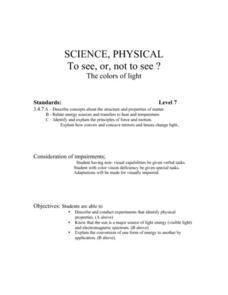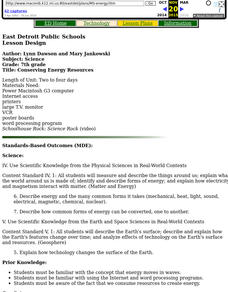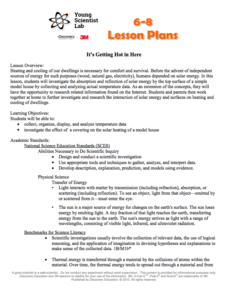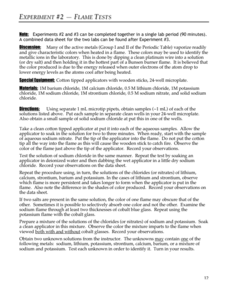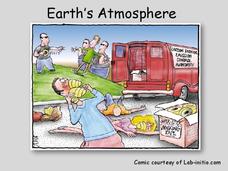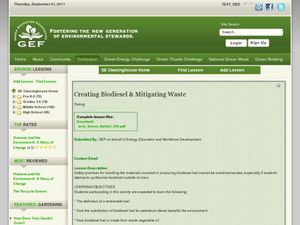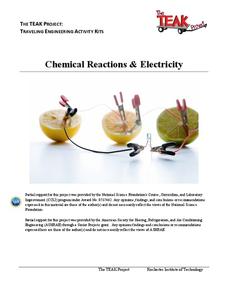Curated OER
To See or Not to See: The Colors of Light
Seventh graders describe and conduct an experiment that identifies the physical properties of light. They explore sources of visible light and an electromagnetic spectrum. Students explain the conversion of one form of energy to another.
Curated OER
Conserving Energy Resources
Seventh graders research on energy conversion. After they have researched several types of energy resources, teams of two to four create posters which depict how these resources can be conserved.
Curated OER
Looking into Surface Albedo
Students demonstrate how the color of materials on Earth affect the amount of solar energy that is absorbed. In this solar energy instructional activity students complete a lab to explore how the color of materials on the Earth's...
Curated OER
What is Light?
Students explore different types of light, and demonstrate reading comprehension skills, including reading strategies, inference, literal meaning, and critical analysis.
Curated OER
Solar S’Mores
Students use the energy of the sun to make s'mores. In this solar energy lesson, students gather the listed materials and follow the procedures to find out if they can make s'mores using solar energy.
Curated OER
Cooler in the Shadows
Learners explore how the amount of sunlight and heat change in areas that are shaded.
Curated OER
Energizing Resources
Seventh graders describe electrical energy and how it is produced. In this natural resource lesson, 7th graders explain the various ways of obtaining and using natural resources for energy and the environmental consequences. They will...
Curated OER
Magnetic Induction
In this electricity activity, students learn about magnetic induction plus compare a generator with a motor. Students also review the different kinds of energy and the formulas associated with energy. This activity has 28 matching, 10...
Curated OER
What’s That, I Can’t Hear You?
Students investigate forms of energy as well as light and sound. In this science lesson, students participate in hands-on activities that require them to evaluate how sound affects astronauts in flight. A video of this lesson being...
Curated OER
Miscellaneous Light Topics
In this light topics science worksheet, students read selections about fiber optics, fluorescent light, incandescent light, total internal reflection, polarization, glow-in-the-dark light, and lasers. Students then respond to 32...
Curated OER
Things That Glow: From Fireflies to Quantum Dots
Third graders observe light energy. In this heat and energy lesson, 3rd graders will study the concept of light as a form of energy. Students will examine the different forms of light and the type of energy it produces.
Discovery Education
It's Getting Hot in Here
Class members engage in a STEM experiment and investigate how materials affect heating in a house by creating models of houses and using different top surface materials. They record the temperature inside the models and consider what the...
Purdue University
Design of a Door Alarm
How does electricity work? Budding scientists explore the concepts of electrical currents and open and closed circuits with class discussion and a hands-on activity using a battery to turn on a light bulb. Learners also make predictions...
Chicago Botanic Garden
Understanding the Greenhouse Effect
Dive into the power of the sun with a two-part lesson. Budding scientists model the greenhouse effect in a hands-on activity, and then participate in a skit that explores the earth's energy balances and what really occurs in the...
Curated OER
Black and White Bottle Experiment
Students investigate solar energy and color. For this solar energy lesson, students assess the benefits of solar energy. Students discover that solar energy is attracted to darker colors and conduct an experiment using colored...
Curated OER
Energy
Students are introduced to the concept of energy. After observing a demonstration, they identify the sources of heat and the ways heat can change objects. In groups, they travel between stations to view different demonstrations dealing...
American Museum of Natural History
They Glow!
Would you believe marine animals can make their own light? An online resource describes the process of bioluminescence and how animals in the ocean use it to survive. The lesson features a catchy tune that describes the behavior of ocean...
American Museum of Natural History
They Glow!
Let there be light! An interactive online lesson describes the process of bioluminescence and how ocean species use it to their advantage. The lesson highlights several specific species as well as provides vocabulary support with...
Pingry School
Flame Tests
Light a fire in your pupils! Scholars conduct a flame test and observe the emission spectra of several different salts in an enlightening hands-on investigation. They use their observations to make comparisons and conclusions about the...
Curated OER
Spectral Lines
Slides and slides of emission spectra bring this topic to light for your physics class! Exited electrons returning to lower energy levels is offered as the cause of emission spectra. In summary, viewers learn that we can determine the...
Science Geek
Earth's Atmosphere
Ozone gas absorbs the harmful UV-B rays and helps protect humans. An informative presentation begins with the layers of the earth's atmosphere, the pressure and temperature in each of the layers, the ozone layer, the ozone cycle,...
Curated OER
Reasons for the Seasons
This worksheet requires the pupils to follow a teacher activity, so more-than-the-usual preparation for a practical is needed. Looking at a globe as it rotates and receives "sunlight" from a flashlight, pupils are able to observe the...
Curated OER
Creating Biodiesel and Mitigating Waste
Biotechnology pros produce their own biofuel using waste oil and fresh vegetable oil. They test the quality of their product using titration techniques and pH analysis. They write their observations and report their findings. Be aware...
Rochester Institute of Technology
Chemical Reactions and Electricity
After a discussion of chemical reactions and electricity, scholars break into groups and follow a scripted activity to discover if fruit can power a clock. After a concluding discussion, the class a presented with a challenge.


